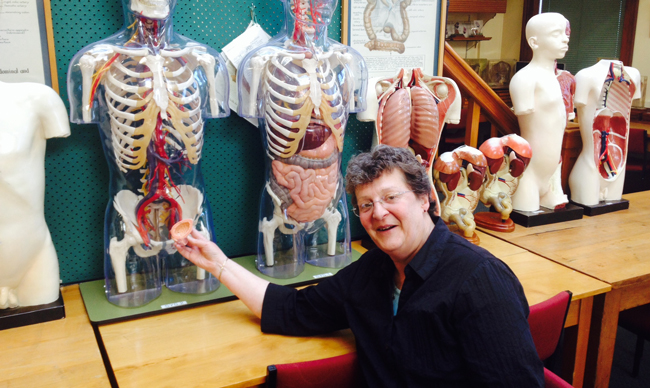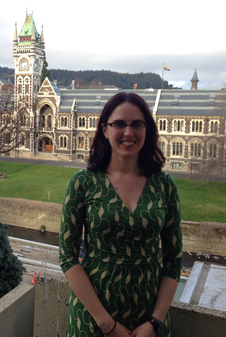Thursday 4 September 2014 8:25pm

Dr Elspeth Gold has won the 2014 Proof of Concept competition with a proposal that could revolutionise the diagnosis of prostate cancer.
Further testing of a biomarker that could revolutionise the diagnosis of prostate cancer has won Otago Innovation Ltd's 2014 Proof of Concept grant.
Dr Elspeth Gold, a lecturer and researcher in the Department of Anatomy, has discovered the biomarker, which may enable the differentiation between the aggressive and latent forms of prostate cancer.
“This differentiation is vital, because although prostate cancer is one of the deadliest cancers in men, its accurate diagnosis and follow-up remain a challenge,” Dr Gold explains.
"Our hope is it identifies who needs treatment early and who can safely be monitored. This would revolutionise the field."
About one in seven men will be diagnosed with prostate cancer during his lifetime. In the majority of cases, this is a slow-growing cancer. In about 20 percent of cases, the prostate cancer is aggressive and can grow quickly, spreading the cancer to other parts of the body.
The “gold-standard” for diagnosis is a prostate biopsy and all men with elevated PSA or abnormal digital exam will be given a biopsy, which is graded by a pathologist. However, this grading does not always differentiate between the aggressive and slow-growing forms.
“Most patients with prostate cancers undergo surgery, despite many remaining latent. Meanwhile aggressive prostate cancers may not be treated early enough, resulting in poorer outcomes in these patients.”
The biomarker discovered by Dr Gold could change all this – and tests so far are extremely promising. In all samples analysed to date the maker has been able to differentiate between aggressive and latent prostate cancer.
“Such a diagnostic test would be of great benefit to clinicians and men suffering from prostate cancer. Our hope is it identifies who needs treatment early and who can safely be monitored. This would revolutionise the field.”
Dr Gold will use the $50,000 Proof of Concept Grant to validate her initial findings.
"We all hope one day to make a breakthrough that changes clinical practice; it's what gets us out of bed in the morning."
Commercially the global value of next generation prostate cancer diagnostics is valued at US $45 million in 2010 with a forecast to reach US $704 million in 2015.
The Proof of Concept competition, created in 2007, aims to encourage researchers to think about possible commercial applications of their work, including what an end product or service would look like, and who would buy it.
This year the competition attracted 18 entries.
Dr Gold says she is humbled and excited to win.
“We all hope one day to make a breakthrough that changes clinical practice; it's what gets us out of bed in the morning. The Proof of Concept Grant is an excellent way to move the work forward and see where the journey takes us.”

Dr Monica Gerth, runner up in the competition.
This year's runner up was Dr Monica Gerth, an early career Researcher in the Department of Biochemistry.
Her proposal was to develop antimicrobial enzymes that can be used to prevent “biofilms” from coating medical devices and causing infections.
Biofilms cause at least 65 percent of all human infections, and are particularly prevalent in hospital settings where they coat the surface of medical devices such as implants and catheters.
They can cause chronic infections and are a major global health problem due to their resistance to conventional antibiotics.
“We are developing novel enzymes that can be used as an antimicrobial, anti-biofilm surface coating. These engineered enzymes can prevent the chemical signalling between bacterial pathogens and prevent biofilm formation before it can start,” Dr Gerth explains.
“Our ultimate goal is for our engineered enzymes to be immobilized onto surfaces, making products that are intrinsically resistant to biofilm formation.”
"I've learned a lot from the experience, and I'm already planning my entry for next year's competition!"
Dr Gerth says she was excited to be runner up in the Proof of Concept competition, particularly because this is a new line of research in her laboratory.
“I really believe our technology has the potential to make a positive impact on biofilm-associated infections. Otago Innovation's support for my research is validation that we are on the right track. I've learned a lot from the experience, and I'm already planning my entry for next year's competition!”
